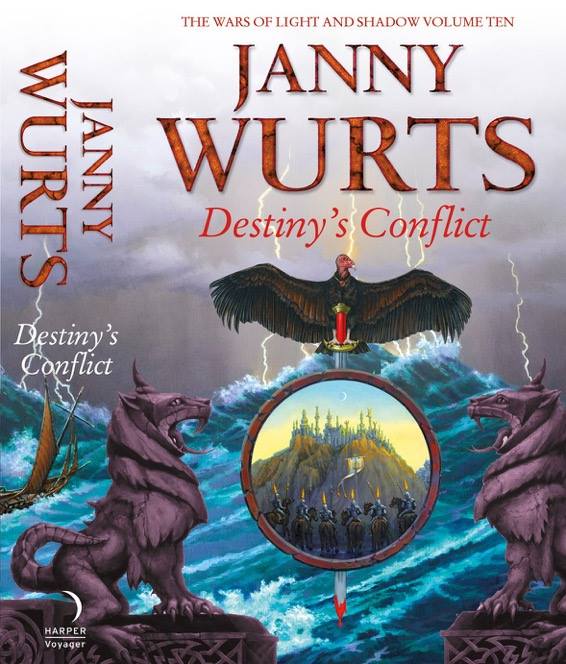Destiny’s Conflict:
Book Two of Sword of the Canon
(The Wars of Light and Shadow Volume 10)
Based on the scope of the story alone, this review has been a while in the works. Janny Wurts does it again: takes on big issues and a big sweep of events, and brings the reader on an emotional ride that doesn’t stop even after the book ends.
Destiny’s Conflict is a whirlwind of action and emotional upheaval. Covering a short span in Atheran time, the book ranges wide, tackling huge issues and offering up staggering reveals. Like Initiate’s Trial before it, Destiny’s Conflict pulls new threads from a story already epic in its exploration of the depths to be found in every person – for better or for worse.
Easily forgotten amidst the grand struggles for power by all parties (and the seemingly-bottomless creative genius of Arithon), is the basic humanity of all the characters. For all the knowledge and power held by the wisest of them, and for all the evil done by the worst of them, in Destiny’s Conflict Wurts manages to remind her readers of the inherent failings and weaknesses that come with being human, no matter who you are.
Destiny’s Conflict works on so many levels – surprising the reader at every turn with swift action and unexpected choices of POV in key scenes. To delve deeply into each layer revealed in this novel would do a disservice to those who have yet to read it, but there are things worth noting in advance of diving in.
Lysear’s story frames the novel in such a heart-breaking way as to make long-time readers re-think all his past actions and interactions.

Arithon’s ongoing loss of self remains torture – with the stakes raised by his flawed self-awareness as dangerous as anything he has before encountered. The twist this time is that the danger arises not on a grand scale, but from the depths of Arithon’s deepest self, laid bare as he remains disconnected from the experiences that have both burdened and steeled him. It is heartbreaking to watch, but necessary remind to the reader of all that is at stake, and on what a fragile thread the future hangs.
And the truth long held in the background, that the women in this series are the ones who really hold humanity’s destiny in their hands, has never been more apparent than in this book. The brilliance of Arithon as a character throughout the Wars of Light and Shadow can blind the reader to the fact that the rock of integrity that is Elaira, and the twisted order of the Koriathan (Gads, Morriel is the baddest bad woman EVER), and the endless and unmarked danger presented by the Beidar, drive every aspect of the story. Backed by a host of other female characters – from Talith to Ellaine to Jinesse to Daliana to Dame Dawr to Feylind, women have always shaped the action in the series. On their choices, strengths, and weaknesses, the whole thing turns.
In fact, things unnoticed and/or forgotten feels to me to be the driving theme of this book. The failings all humans have – in forgetting history, or failing to learn from it, in putting the powerful or beloved on pedestals while forgetting that no human being is without weakness or flaw, in being unwilling to look beyond our own desires and expectations – are bared, unvarnished, and without any attempt to ease their harshness. As a reader, I was forced to look at the characters I love best and see their darkness and their faults, and at the characters I have liked least, and see them truly as people.
From the failings of the Fellowship of Seven, to the ongoing mystery of North Gate and the wary-making machinations of the Beidar, to the heart-rending finale that left me shell-shocked for a week – Destiny’s Conflict is a book that defies expectation. In doing so, it demands attention, as well as a willingness on the part of the reader to set aside expectation and just hang on.
It’s going to take some distance and several re-reads for me to feel I have a full grasp of everything that revealed in the conclusion of Arc Four. As always in the Wars of Light and Shadow, the story leads nowhere I can predict – which is both the genius and the torture of the work.
Brava, Janny Wurts! I can’t wait for The Song of the Mysteries!


